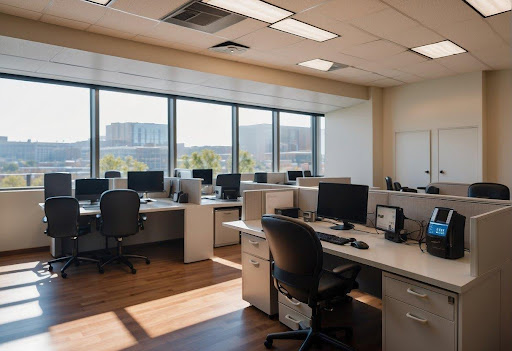
As the summer heat intensifies, maintaining a comfortable and energy-efficient office environment becomes a vital task. Office managers and business owners are tasked with balancing the need for cool, refreshing air with the practicalities of energy consumption and cost. The performance of an office’s HVAC (Heating, Ventilation, and Air Conditioning) system takes center stage in this effort. Proactive measures can prevent system breakdowns, reduce energy bills, and extend the life of the HVAC equipment.
Temperature regulation in an office not only affects the comfort of the employees but also influences productivity and morale. An HVAC system operating at its best can provide a steady, cool climate while filtering out pollutants and maintaining adequate humidity levels. This creates a healthy atmosphere where employees can focus on their work without the distraction of discomfort.
To ensure that offices achieve this balance, certain strategies can be implemented. These include regular maintenance check-ups, smart thermostat settings, and considering upgrades to more energy-efficient models. While some recommendations involve professional services, others can be carried out by staff members themselves. Staying informed about HVAC care during hot weather helps offices avoid common pitfalls and enjoy a summer free of unexpected disruptions.
Optimizing HVAC Performance
Effective management of an office’s HVAC system is crucial for maintaining a comfortable and energy-efficient environment. Strategically implementing programmable thermostats and ensuring regular maintenance checks are fundamental for optimizing HVAC performance.
Programmable Thermostats
Programmable thermostats allow precise control over office temperatures and operation schedules, leading to enhanced comfort and reduced energy expenses. Key benefits include:
- Customization: They can be set to adjust temperatures based on office hours, reducing energy use when the space is unoccupied.
- Consistency: Help in maintaining a consistent temperature, preventing the system from overworking.
Setting up programmable thermostats should involve:
- Planning: Establishing a schedule that aligns with office hours.
- Installation: Done by trained professionals, preferably verified HVAC experts in Houston for local businesses.
- Training: Ensuring staff understands how to adjust settings if necessary.
Regular Maintenance Checks
Regular maintenance checks are vital to ensure that an HVAC system operates at peak efficiency and to prevent unexpected breakdowns. Important aspects include:
- Air Filters: They should be replaced or cleaned every 1-3 months to maintain airflow and air quality.
- System Components: Inspection of belts, coils, and other critical components to mitigate wear and tear.
HVAC professionals in Houston recommend the following maintenance timeline:
- Monthly: Visual inspections and air filter checks.
- Seasonally: More in-depth inspections before major weather changes.
- Annually: Comprehensive checks and tune-ups by certified experts.
By adhering to these guidelines, businesses can significantly optimize their HVAC system’s performance, ensuring a pleasant office atmosphere and efficient energy usage.
Energy Efficiency and Cost Reduction
Maintaining optimal HVAC performance significantly reduces energy consumption and operational costs in the office environment. The adoption of advanced insulation techniques and zoning systems plays a crucial role in achieving these efficiencies.
Upgrading Insulation
Upgrading to high-quality insulation helps maintain consistent indoor temperatures, which can lower energy usage. For instance, installing reflective insulation in an office situated in Houston responds well to the city’s hot climate by reflecting heat away from the building. This reduces the burden on HVAC systems and leads to cost savings.
- Materials: Fiberglass, cellulose, foam board
- Benefit: Reduced energy transfer; maintains cool indoor air
Implementing Zoning Systems
Integrating zoning systems allows for the precise control of temperature in different office areas, ensuring energy is not wasted on unoccupied spaces. HVAC experts in Houston might recommend:
|
Zone |
Control Example |
Expected Benefit |
|
Individual offices |
Thermostats with timers |
Personalized comfort |
|
Common areas |
Motion sensor temperature control |
Reduced cooling when unoccupied |
|
Overall System |
Variable Air Volume (VAV) systems |
Efficiency in air distribution |
By zoning, businesses can achieve significant reductions in utility bills. Each zone operates independently, offering greater control and avoiding the inefficiencies of a one-size-fits-all approach.
